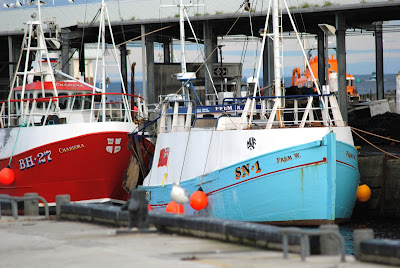This blog may help people explore some of the 'hidden' issues involved in certain media treatments of environmental and scientific issues. Using personal digital images, it's also intended to emphasise seasonal (and other) changes in natural history of the Swansea (South Wales) area. The material should help participants in field-based modules and people generally interested in the natural world. The views are wholly those of the author.
Saturday, 5 February 2022
Fish Waste on an Epic Scale
The Dutch-owned but Lithuanian-flagged trawler, FV Margaris, is the world's second biggest fishing vessel. Its operators have admitted that it was responsible for a floating mass of dead fish off the French coast (https://www.theguardian.com/environment/2022/feb/05/shock-in-france-after-giant-trawler-sheds-100000-dead-fish-off-coast). The 100,000 dead fish were largely Blue whiting. These, relatives of the cod, are usually used make make fish fingers and dietary oils. The floating mass covered an area of circa 3000 square metres. The fish industry group, the Pelagic Freezer-Trawler Association (PFTA), represent the owners of the Margaris. They claimed that the 'spill' was due to a rupture in the trawler's net. These, are a 'very rare occurence', say the PFTA. That's alright then? Trawler operators have a legal obligation to report such spills. Would this have happened, if the spill had occurred in a more remote location of the globe with less intense monitoring?
Subscribe to:
Post Comments (Atom)
-
I n the UK and US, a pparently popular and successful vegan/vegetarian restaurants are reportedly closing or adding meat to their menus ( ...
-
Early ripening fruit may seem convenient but some folk think it confirms environmental stress. There's also a possibility th...


%20mating%20NWCW.jpg)


No comments:
Post a Comment